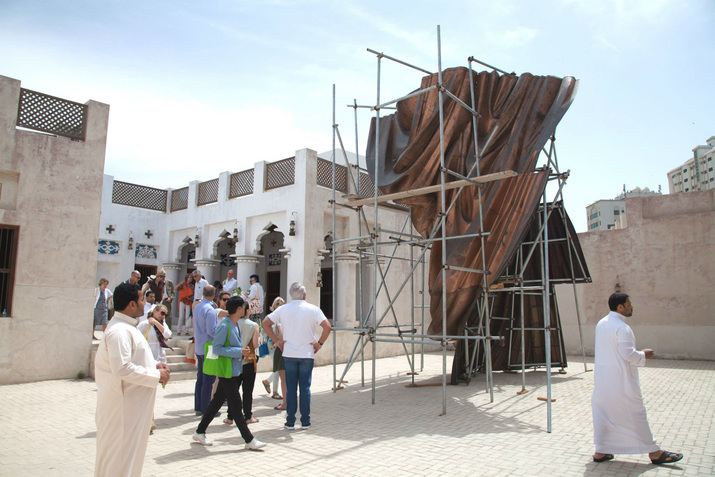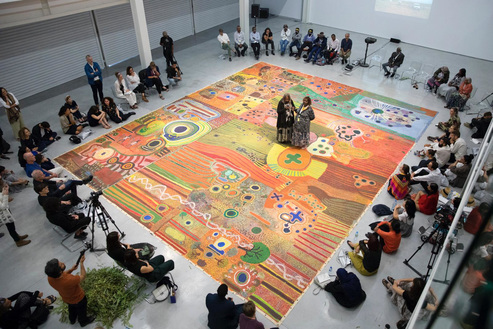
R
E
V N
E
X
T
Recap of March Meeting 2021: “Unravelling the Present”
Screenshot of the roundtable, “Sharjah Biennial in Retrospect,” with Hoor Al Qasimi, Peter Lewis, Jack Persekian, and Suha Shoman, moderated by Tarek Abou El Fetouh, at March Meeting 2021, hosted by Sharjah Art Foundation on Zoom, March 12, 2021. Image by HG Masters for ArtAsiaPacific.
To see the world from the perspective of Sharjah—this possibility, as both reality and as metaphor, begins to suggest what decolonization might look like. Since 2008, the Sharjah Art Foundation (SAF)’s annual program of conversations and lectures known as the March Meeting, usually held in concert with, or in the run-up to, the Sharjah Biennial, has been the discursive platform where artists, curators, scholars, and engaged professionals assemble to listen and converse with one another on topics integral to contemporary art from the Global South.
Delayed by a year due to the pandemic, March Meeting 2021: “Unravelling the Present” is the prelude to the 15th edition of the Sharjah Biennial, “Thinking Historically in the Present,” which is a posthumous homage to the late curator Okwui Enwezor. In her welcome to the March Meeting, SAF president Hoor Al Qasimi cited the influence of Enwezor’s Documenta 11 (1998–2002) on her own determination to establish an organization in Sharjah that could contribute to the global conversation about art. Enwezor had launched his edition of the festival into the art world spotlight by holding preliminary events in locations including Lagos, New Delhi, and Saint Lucia, and by showcasing many leading contemporary artists whose practices were rooted in the experiences of the non-West. Throughout the ten-day-long March Meeting program this year, Enwezor’s curatorial practice and his influence were invoked, as participants surveyed topics ranging from the institutional history of SAF itself and the establishment of biennials in the Global South to the intellectual and artistic practices that have underpinned the art of decolonization.
The intellectual progression of 21st century art can be viewed through the evolution of the Sharjah Biennial and the Sharjah Art Foundation. This became evident in the first three panel discussions, which centered on phases of the organization, beginning with reflections by speakers including Emirati artists Mohammed Kazem and Mona Al Khaja about the Biennial’s focus on the Emirati and Arab art scenes in its first decade during the 1990s. The second conversation featured Amman-based artist Suha Shoman and British curator Peter Lewis, who was recruited by Al Qasimi for the sixth Biennial to help transform the festival into a more international event. The panel also included Jerusalem-based curator Jack Persekian, who led subsequent editions and the establishment of SAF as a year-round organization with permanent staff and exhibition spaces. The third roundtable brought together artists and curators of recent editions, such as Eungie Joo (Sharjah Biennial 12, 2015) and Omar Kholeif (Sharjah Biennial 14, 2019), as well as recent participating artists John Akomfrah, Amina Menia, and Otobong Nkanga, who reflected on the position of the Biennial in the last decade.
The keynote lectures were highlights of March Meeting ’21. French political scientist Françoise Vergès discussed Audre Lorde’s idea of “dismantling the master’s house” through strategies of reparative justice. Architect Adrian Lahoud spoke about “decolonizing the architectural exhibition” in the context of the curatorial research he did on the first Sharjah Architecture Triennial (2019), which featured the incredible Ngurrara canvas created by Indigenous communities in Australia to assert their ancestral ownership of the land in a settler-colonial court. Mali-born filmmaker and historian Manthia Diawara gave an engaging talk on the intellectual debate between Frantz Fanon and Édouard Glissant on their respective (and opposing) concepts of “de-opacification” and “the right to opacity” in the context of decolonial and postcolonial discourses.
March Meeting is always an opportunity to hear the latest from leading figures in contemporary art as well as professionals whose practices are more academic or adjacent to the art world. For instance, Salah M. Hassan, director of the Africa Institute in Sharjah and a professor at Cornell University, presided over a conversation between artist Zarina Bhimji—whose exhibition at SAF runs to April 10—the well-known Indian critic and curator Geeta Kapur, and art historian Ming Tiampo, whose respective professional practices each tackle legacies of colonial periods. I appreciated artist Coco Fusco’s approach to moderating a conversation with five curators—Carolyn Christov-Bakargiev, Catherine David, Bongiwe Dhlomo-Mautloa, Gabi Ngcobo, and Octavio Zaya—by asking each of the speakers a direct question, which helped shape a discussion about mega-exhibitions in the age of globalization.
More than one year into the pandemic, the advantages of a remote conference are evident—particularly in attracting a potentially larger audience, though the reality of time zones still raises a geographical center-periphery issue. But what is lacking are all the conversations and interactions that happen before and after the event between attendees (Christov-Bakargiev herself noted there was less of an intellectual commitment in these online events), and the unique intra-human sparks that can electrify a room when ideas converge or speakers cross wires. While conversations of this particular digital edition of March Meeting were less interactive than in previous years, and the temporary community of attendees never formed, its future digital life might offer an invaluable resource for those wanting to study the important intellectual shifts of the international art world of the last two decades. These are shifts evident in the real world, too, with the recent announcement that the Humboldt Forum in Berlin will not show looted Benin bronzes and the German government is in discussions with Nigeria about returning them to the Edo Museum of West African Art—a topic art historian Chika Okeke-Agulu raised as part his keynote talk and an indication of how the conversations initially circulating in the art world eventually, often belatedly, come to impact larger conversations about global culture.
HG Masters is ArtAsiaPacific’s deputy publisher and deputy editor.
March Meeting 2021: “Unravelling the Present” took place online on March 12–21, 2021.














